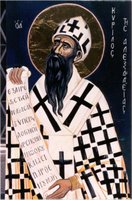 Of the Seven Ecumenical Councils, the last three do not figure prominently in much of modern Western Catholic theology--most especially Lutheran theology. This lack constitutes one of the barriers between Eastern and Western christology since the former relies heavily on the christological definitions promulgated in the final three councils while the latter appears unfamiliar with the issues and formulations.
Of the Seven Ecumenical Councils, the last three do not figure prominently in much of modern Western Catholic theology--most especially Lutheran theology. This lack constitutes one of the barriers between Eastern and Western christology since the former relies heavily on the christological definitions promulgated in the final three councils while the latter appears unfamiliar with the issues and formulations.The Sixth Ecumenical Council in particular dealt with the question of whether the united divine and human natures in Christ resulted in Him having "two wills." The monothelites argued that Christ had two natures but only one will; that is, He divine nature willed all that He desired and His human nature had no will of its own, and so passively acquiesed. A key point in the debate revolved around the traditional interpretation of Our Lord's Gethsemane prayer, "Father, if thou wilt, remove this chalice from me: but yet not my will, but thine be done" (Lk 22.42).
Below is an excerpt from St Cyril of Alexandria on this very question. St Cyril was champion of the Third Ecumenical Council, and his articulation of christology is still that which officially holds sway (thanks to Martin Chemnitz) in the 1580 Book of Concord. His interpretation of this passage, especially as we approach Holy Week, is most instructive.
That the suffering on the Cross was in a sense not willed by Christ the Saviour, yet at the same time was willed for our sake and the good pleasure of God the Father is something you will in consequence understand. For when he was about to ascend to him and addressed his discourses to God, he said clearly in the form of a prayer, 'Father, if it be possible, let this cup pass from me; nevertheless, not as I will, but as thou wilt' (Mt 26.39). That the Word was God, immortal and incorruptible, and by nature Life in itself who could not cower before death, is I think abundantly clear to all. Nevertheless, having come to be in the flesh, he allows himself to experience the things proper to the flesh, and consequently, when death is at the door, to cower before it, that he might appear to be a real human being.
That is why he says, 'If it be possible, let this cup pass from me.' What he means is this: 'If it be possible, Father, that without suffering death I should win life for those who have fallen under its [death's] power, if death could die without my dying, that is to say, with regard to the flesh, let the cup pass from me. But since this cannot take place in any other way, not as I will but as thou wilt.' Do you see how weak human nature is, even in Christ himself, when it relies on its own powers? Through the Word that is united with it, the flesh is brought back to a courage befitting God and is retrained in order to have a more valiant spirit, so as not to rely upon what seems right to its own will, but rather to follow the aim of the divine will and eagerly to run towards whatever the law of the Creator call us.
St Cyril of Alexandria, "Commentary on John," translated by Norman Russell in The Early Church Fathers, p. 112-113
No comments:
Post a Comment